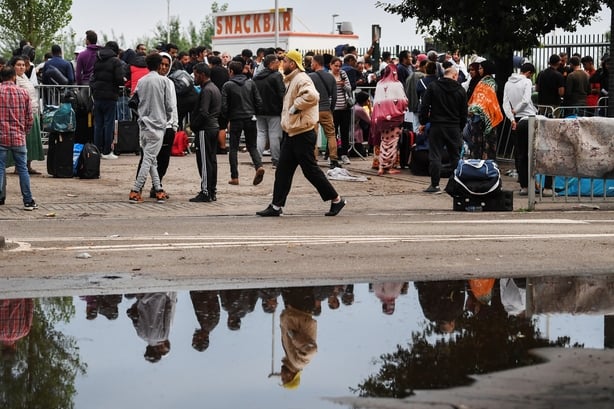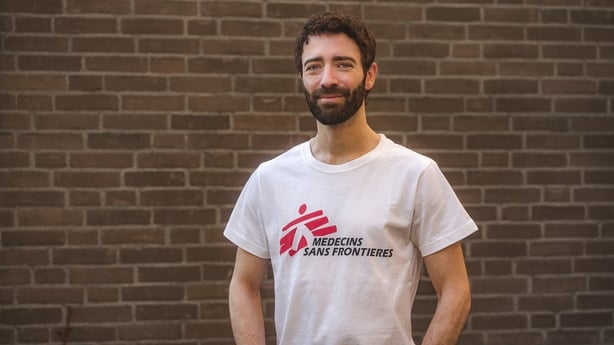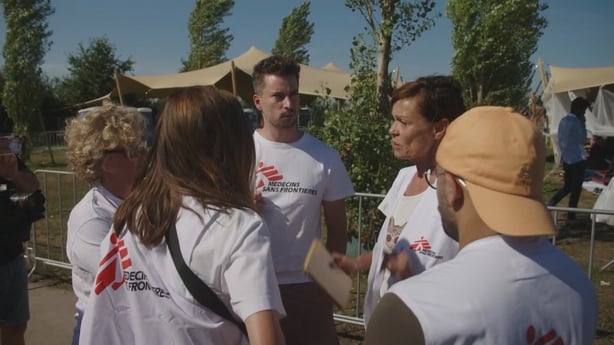Almost 700 asylum seekers in the Netherlands have been left sleeping in unsanitary conditions outside a reception centre for weeks, in what a humanitarian NGO has called a "perfect storm" of poor government planning and a housing crisis.
This has led to "inhumane" conditions at the Ter Apel reception centre for some of the most vulnerable with rain forecast for this weekend.
The death of a three-month-old infant is now being investigated inside the site - a former gymnasium - to see if it is linked to the overcrowded conditions there.
Médecins Sans Frontières (Doctors Without Borders) has had to offer its services in the Netherlands for the first time ever, after an assessment found living conditions at the centre were comparable to those in the notorious Moria refugee camp on the Greek island of Lesbos.
"It is a unique occurrence for us," Karel Hendriks, Operations Advisor with MSF in the Netherlands, told RTÉ News.
"Clearly, we are embarrassed that we have to do this, and this is not how donor money should be spent. It should not be spent in a country like the Netherlands," he added.
"At the same time, we go places based on needs," he said.
"We found needs were the equivalent of what we find are the needs of refugees and internally displaced people in other places in the world. So, there was no justification not to do it," Mr Hendriks said.
The Netherlands, like Ireland and much of Europe, has been grappling with the challenges of appropriately dealing with refugees coming from everywhere from Syria and Afghanistan to Africa.
The recent increase in numbers from Ukraine has further strained a system already under pressure.
Ter Apel, in the northeast of the country, is where applicants are funnelled first, into an asylum system that was already creaking at the seams.
There is a shortage of accommodation for them to move on to and not enough staff to deal with their many complex needs.

The death of the baby on Wednesday brought the world's attention to what was going on there.
Authorities are trying to establish if there is a causal link between the death and the overcrowded and insanitary conditions inside the former gymnasium.
The probe will also examine what medical care was available to the baby.
A statement issued by the Dutch Justice Department said yesterday: "Currently, little is known about the baby's death, but first aid given failed to reanimate the child.
"Youth Care and Justice Department inspectors are probing the infant's death, which happened at a sports hall used as an emergency shelter."
Details of the baby's gender and nationality have not been released as the investigation continues.
Even before the reported infant death, the Dutch Council for Refugees had filed a lawsuit against the government over the standards at the Ter Apel site, which it says violate European law.

The case is expected to be heard at the district court of The Hague next month.
Whilst most women and children are accommodated inside the gymnasium, MSF found poor sanitary conditions there with no proper access to running water and unclean toilet facilities.
Some people they spoke to there had not been able to wash for a week with many needing to be treated for skin conditions, unhealed wounds and respiratory problems.
"It was actually the Red Cross that told us their first aid was no longer efficient considering the more severe medical needs that people were presenting with there," Mr Hendrik said.
"We are facing people with lots of chronic diseases, skin diseases, urinary tract infections, respiratory tract infections, quite a lot of wounds that have not been treated over the course of people’s journeys and that have started to infect," he said.
"Some of these conditions may have been pre-existing but are definitely not ameliorated by these conditions," he added.
'It's going to be worse and worse'
Hundreds of others have been left sleeping outside under the elements and the provision of adequate meals is also a concern.
Ibrahim Alfawal, from Syria, told Dutch broadcaster NOS this week: "We sleep in the open air. Last night it was so cold, we couldn’t sleep at all."
With rain forecast for this week, he said: "It is going to be worse and worse."

Another man from Syria, who did not wish to be identified, said he had been waiting outside the main door of the reception centre for over a week: "Today, I have nothing to sleep in. I am still spending this night on the ground. I need a roof to cover myself, I need something.
"Actually, I came from a war zone. I have a war in my country and I cannot go back. I came here for a place to live and a proper job. If I am being treated like this from the beginning I don't know how it will be in the future. I didn't think that Europe is like this, especially Netherlands is like this. No."
Mr Hendriks said sleeping outside brings its own problems in medical terms.
"Whether it is the heat of yesterday, 30 plus degrees, or the forecast rain of today, it demonstrates that this is not a place that people can stay for any length of time," he said.
"It will affect anybody’s health if you are exposed to the elements for a week or even longer. That goes for the occasional pregnant woman or a child that is still on the field - although most are being brought in - but of course also young men that are not allowed in and that are not receiving any priority treatment," he added.
"They are affected by this exposure, and they often come to the field in already not a good state and what is clear is these conditions have a real risk and sometimes exacerbate conditions they already have," Mr Hendriks said.
No 'flow through' amid housing crisis
As asylum systems across Europe grapple with a fresh wave of refugee arrivals, MSF said it is important that governments are prepared and ready to act as situations change.
"It is often in Dutch policy circles, called a 'perfect storm’," Mr Hendriks said.
"Its important to be aware that Ter Apel is the very start of the Dutch asylum chain, it is the reception centre," he said.
"What currently happens is there is no flow through the rest of the chain so the people who are supposed to leave the reception centre and go to a longer-term facility, cannot go there because the people who have received a permit cannot move into a house because of a housing shortage," he added.

A recent lay off of staff working in Dutch reception centres when application numbers dropped temporarily has further exacerbated what Mr Hendriks believes is a man-made crisis that could have been prevented.
He said this could be a salutary lesson for other European governments.
"One lesson that we can clearly draw from the Netherlands and that is clear for all to see is that the decision to downscale all reception beds at a time of a temporary trough in arrivals was not a good call and there has been no capacity within reception agencies to scale back up," Mr Hendriks said.
Local opposition
The mayor of Groningen, where Ter Apel is situated, said yesterday: "We have reached a low point in our country."
Koen Schuiling called on other municipalities to open their doors and help alleviate the overcrowding there.
However, some attempts to open asylum-seeker accommodation elsewhere have met with fierce resistance.
Residents of the small eastern town of Albergen have been protesting for days against the Dutch refugee agency’s plans to house up to 300 asylum-seekers in a local hotel.
Chanting slogans like "No to asylum seekers!" and "Go away!", residents said the decision was forced on their rural town, despite objections.
Additional reporting AFP







